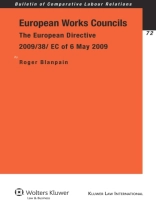Involvement of employees in the social dialogue has always been an ongoing and vigorous concern of the European Union. Over the years since the European Works Councils (EWCs) were established in 1994, expectations regarding their role have grown, particularly in anticipating and managing change as corporate activities have become increasingly internationalized. Finally, after fifteen years of ongoing debate, Directive 2009/28/EC, establishing a new legal framework for EWCs, took effect in June 2009, with Member States obligated to implement the new rules at national level by June 2011. The 2009 Directive is intended to ensure that employees’ transnational information and consultation rights are effective, to increase the number of European Works Councils established, to strengthen the legal certainty of negotiated outcomes involving EWCs, and to ensure that the directives on information and consultation of employees are better linked. This essential guide is the first publication to annotate and analyze the new Directive. It describes the many changes from the previous Council Directive 94/45/EC, and expertly traces the legislative history through all the intervening preparatory documents. It examines the most important provisions in depth, shedding clear light on such issues as the following: – the new definitions of ‘information’ and ‘consultation’; – the nature of the stronger links between national and transnational levels of employee information and consultation; – employers’ obligation to pass on information to local representatives of employees; – training of EWC members; – the composition of the Special Negotiating Body (SNB); – the presence of experts, including trade union representatives, in negotiation meetings; – employee representatives’ right to collectively represent the employees; – the role of EWCs and workers’ representatives in the EU’s merger control procedures; – fall-back rules that improve EWCs’ consultation in case of restructuring; and – provisions ensuring that EWCs are informed and consulted without calling into question the company’s capacity to adapt. The author’s insightful perspectives – e.g., on how the courts are likely to interpret such phrases as "rights arising from the directive" in specific contexts – add greatly to the practical value of the analysis. Annexes include virtually all relevant primary documents, encompassing pronouncements of the Commission, the Parliament, the social partners, and the European Economic and Social Committee. Beyond a doubt, this timely bulletin is essential reading for representatives of multinational enterprises operating in the EU, labour law and industrial relations scholars, representatives of trade unions and employers’ associations, human resources professionals, lawyers negotiating EWC agreements, and concerned policymakers and government officials.
Roger Blanpain
European Works Councils [PDF ebook]
The European Directive 2009/38/EC of 6 May 2009
European Works Councils [PDF ebook]
The European Directive 2009/38/EC of 6 May 2009
Achetez cet ebook et obtenez-en 1 de plus GRATUITEMENT !
Langue Anglais ● Format PDF ● Pages 304 ● ISBN 9789041158147 ● Éditeur Roger Blanpain ● Maison d’édition Wolters Kluwer ● Publié 2009 ● Téléchargeable 3 fois ● Devise EUR ● ID 8092459 ● Protection contre la copie Adobe DRM
Nécessite un lecteur de livre électronique compatible DRM












